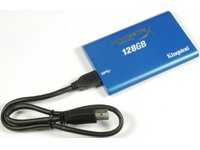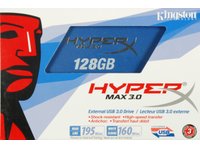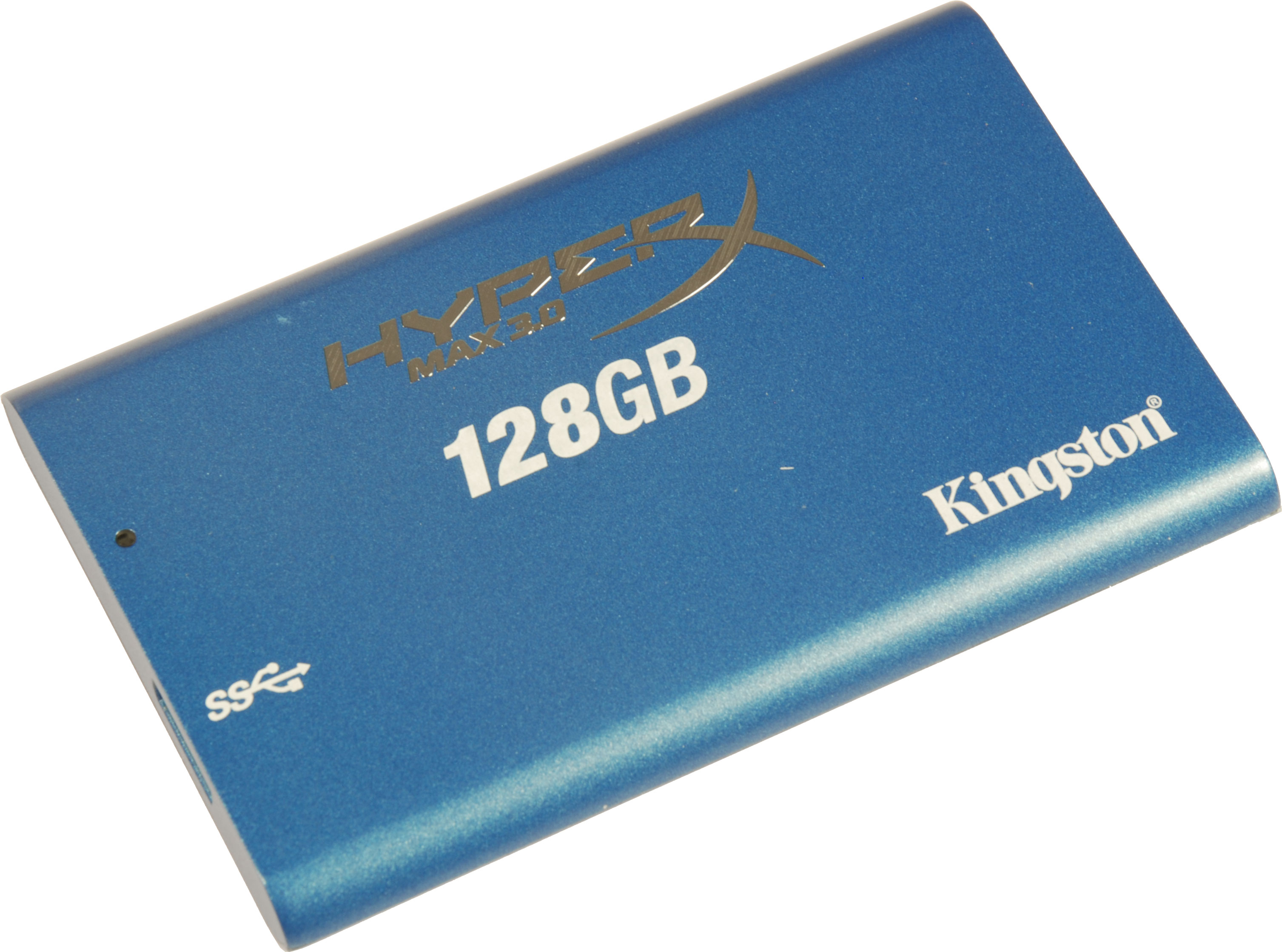Nine USB 3.0 Flash Drives For Road Warriors
The best ultra-portable USB 3.0 storage products from 16 to 128 GB square off in a grand comparison. We found wildly disparate transfer rates ranging from 200 MB/s down to a snail’s pace. At the end, though, two products rose to the top of our list.
Kingston HyperX Max 3.0 (128 GB)
The HyperX Max 3.0 is, like the Enyo from OCZ, not a thumb drive, since it is the size of a pack of cigarettes. It delivers strong performance and decent capacity. The 128 GB model we tested sells for around $300, which is high, but appropriate when we look at the product’s horsepower. Kingston offers a three-year warranty.
The drive is not a blasé black, white, or grey, but rather housed in a metallic blue, which is visually pleasing. The drive connects via USB cable, which of course you must not forget to bring with you. One USB 3.0 cable is included.
On its product overview page, Kingston promises a read speed of up to 195 MB/s and a write rate of up to 160 MB/s, both sequentially. Our measurements showed 193-185 MB/s read speeds and 189-177 MB/s writes. The HyperX Max 3.0 is unbeatable in the combined reading/writing category, achieving 101.1 MB/s. This is faster than any of the competitors in this shootout, and an advantage if you want to create a system backup while copying music from the HyperX Max 3.0 to the computer. There are hardly any delays compared with other products in this test, which all demonstrate combined data rates between 8 and 30 MB/s. However, the HyperX Max’s I/O performance is merely average.
Kingston barely misses our recommendation. In a direct comparison, we prefer the OCZ Enyo, which simply surpasses the HyperX Max 3.0, especially when writing. This is the deciding factor when it comes to efficient transfers when you need to take larger amounts of data with you and you’re in a hurry. Otherwise, Kingston’s drive doesn’t have any significant weaknesses.


Get Tom's Hardware's best news and in-depth reviews, straight to your inbox.
Current page: Kingston HyperX Max 3.0 (128 GB)
Prev Page Kingston Data Traveler Ultimate 3.0 (64 GB) Next Page LaCie FastKey USB 3.0 (120 GB)
Patrick Schmid was the editor-in-chief for Tom's Hardware from 2005 to 2006. He wrote numerous articles on a wide range of hardware topics, including storage, CPUs, and system builds.
-
spectrewind Conclusion: This article ignores encryption.Reply
The article is a complete failure. You THG people ignored encryption as a metric. Why??!!
Flash drives are cheap. Company information and regulatory items (HIPAA for example) are priceless.
I'm a "road warrior" that depends on a flash drive for my daily work: IRONKEY. My employer provides it. I am legally required to use it. It is hardware encrypted. The drive might be stolen or lost, but the data will not seen by any unauthorized user.
If I lose my drive, the physical media is lost. I have medical databases that I am required to keep secret via government regulation. My drive will wipe itself after 10 incorrect login attempts.
Do any of the reviewed drives on THG do this? -
sudeshc Extremely good read, what i liked was that the companies are not making false claims anymore most of them performed as was claimed.Reply -
sudeshc spectrewindConclusion: This article ignores encryption.The article is a complete failure. You THG people ignored encryption as a metric. Why??!!Flash drives are cheap.Reply
This in my opinion is altogether a different topic and should be covered in different article where the encryption also as well as over performance be compared.
-
cangelini sudeshcThis in my opinion is altogether a different topic and should be covered in different article where the encryption also as well as over performance be compared.Reply
Agreed, I'll pass that feedback along to the author. -
Sphex If you actually read the article, you would know that the SuperTalent SuperCrypt encrypts its data with a password, like the IRONKEY. Maybe you should read.Reply -
spectrewind SphexIf you actually read the article, you would know that the SuperTalent SuperCrypt encrypts its data with a password, like the IRONKEY. Maybe you should read.Reply
I did read the article. One drive supporting cryto does not a metric make, which I mentioned. That feature is an anomaly and not a fundamental feature (metric) of the article.
"Maybe you should read."
Reading is good. Comprehension is even better. I suggest you begin there, since you obviously cannot do that. -
injected_metal Reply9513351 said:IRONKEY. My employer provides it. I am legally required to use it. It is hardware encrypted. The drive might be stolen or lost, but the data will not seen by any unauthorized user.
Your post reads like an advertisement and you complain that they didn't do an encryption comparison when only 1 drive supports it at hardware level. On top of that cant you read, this is a USB 3.0 test, ironkey only does 2.0. Furthermore your employer provides your drive so what difference would it make if they said your ironkey was a slow but safe piece of $#!t? This is an everyday-user drive roundup for fast file transfer, not a business specific roundup that would be useless to most tom's readers. You said it yourself, your company provides secure storage since they expect you to move important files. Typical users won't need this and if they do the decision most likely will be out of their hands. Additionally in a security environment the protection far outweighs the need for speed, so the test metric would be completely different than how consumer grade drives would be tested.
tl;dr
You don't seem to comprehend the use of your drive and what features the owner actually values. -
willgart some test with encryption enabled are missing. what is the impact of an encrypted drive? what are the encryption option?Reply
we do not always looking for speed, we are also looking for backup or archive of sensitive data.
and other peoples are looking for speed only, for sure, because they hate loosing time in data transfert :)
but the same questions are also for classic HDD, not only USB keys. -
Bolbi I purchased a 16GB A-DATA S102. It's not a premium product, but it does receive a significant performance boost from USB 3.0 (according to other reviewers; my USB 3.0 laptop is still in Fedex's hands). The drives in this review, I think, are for those who need only the best features and performance. The average user can still get better performance out of a "regular" USB 3.0 flash drive.Reply
